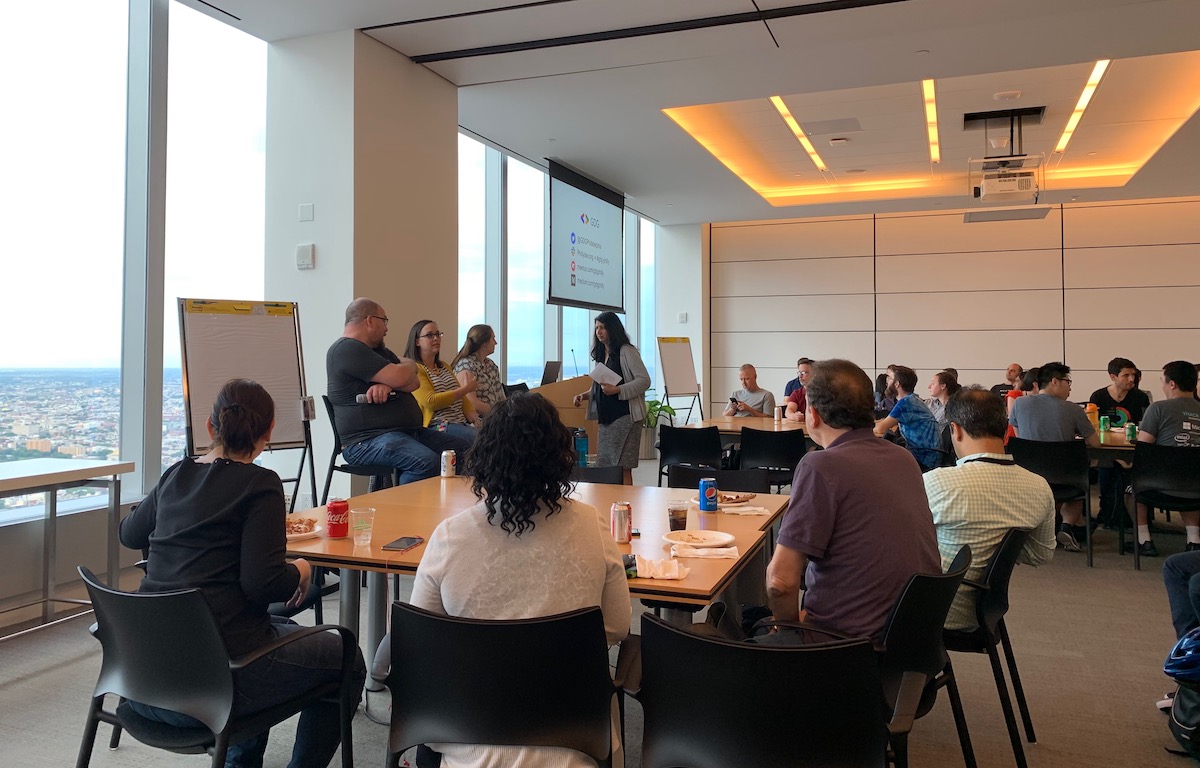There’s no one-size-fits-all career pathing in the tech industry.
About 50 developers gathered high up on the 45th floor of the Comcast Center for the 100th meetup of GDG Philly, a group for folks interested in Google’s technologies, on Wednesday night to talk engineering career moves.
“It’s rare for a group to last this long,” said co-organizer Yash Prabhu, a senior engineering manager at Comcast: The meetup started a few years ago, and is now more than 1,700 members strong. Wednesday’s event welcomed members in for a panel on “navigating your career as a technologist,” moderated by Prabhu.
Panelists Mel Shafer, QA team lead at Warner Bros Digital Labs; Brian McElaney, SVP of Think Company; and Audrey Troutt, director of mobile engineering at Comcast, talked their career trajectory, interviewing, resumes, team dynamics and culture fit in Philly’s tech scene.
Here are some notable ideas we heard during the discussion.
A “nontraditional” background is A-OK.
Neither Shafer, McElaney nor Troutt intended to go into the development world when they first started planning their careers, they said. Shafer had initially looked into teaching, McElaney joined the military and Troutt studied physics and music during undergrad.
But due to curiosity or wanted to create something themselves, they all found their ways into the tech world. And when it comes to learning the skills necessary? There’s a few ways into the field, they said.
“You can learn a lot on your own with programing and app development, but there’s still some value in structured education. It’s really about knowing how you learn best,” Troutt said. “What I see people doing successfully is getting that base of skills, bootcamp, doing projects or getting a degree. A lot of it is getting yourself in with meetups or groups or connections like this that will be your foot in the door.”
The state of interviewing for tech jobs could use a change.
“Never in my natural working experience have I had to write code on a whiteboard,” Shafer said. “There’s got to be a [better] way of verifying someone’s skills.”
The classic dev interviewing tactic doesn’t really hold up in real life, she said. Instead, as manager, she likes to make interviewees write a function that she and her coworkers could use and solve themselves.
Shafer also added that she sees value in asking pointed tech questions with context, like, “what is your experience with Python, because we use it in these specific ways.”
And when it comes to a harder question or a topic an interviewee doesn’t know the exact answer to, it’s best to fess up to that, but explain what you do bring to the table, or what you know about similar programing languages.
“I think you learn a lot by the way a company interviews,” Shafer said. “I ask tech questions, yes, but that’s not the only thing I look for. Do you understand systems? Do you know how you best learn?”
Fitting into company culture isn’t the most important thing, but it’s still pretty important.
Yes, tech companies need to know that their employees know the technology, but they also have to know that they’ll fit in as a part of the team, panelists said.
McElaney said that tech companies sometimes fail to realize how the roles and personalities of their employees have to work together and, “it’s something that holds us back.”
“I want to know what books you’ve read lately, do you know the giants in the industry, where have you previously worked and what were the company values there?” he said.
But making sure the company is a good fit for you, and not just that you’re a good fit for the company, is important too, panelists said.
Shafer and Troutt said that as women working in tech, it’s been essential to have other women representatives to look up to.
“You want to walk into a company and know that there are other people that look like you and represent who you are,” Troutt said. “Looking at the leadership of the company is a great indicator in who they’ll invest in.”







